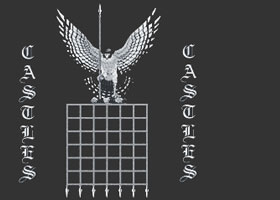- Life in the castle started at dawn
- Mass would be heard in the Chapel and additional private prayer might be made in the oratory
- Breakfast
- Lord would attend to business matters in relation to his land. Reports would be heard regarding estate crops, harvests and supplies. Finances - rents, taxes, customs and dues
- Complaints and disputes regarding tenants would be settled, permission to marry etc
- Political discussions and decisions
- As the Medieval era progressed time was spent on the arts - poetry, music etc
- Weapon practise
- The Lady would spend time on overseeing some important household duties
- Mid morning prayer and meal
- Lord would go hunting, hawking or inspect the estate
- Ladies would undertake needlework, embroidery etc
- Evening prayer and then supper in the Hall
- After supper there might be some Castle entertainment - music, dancing, masques, jugglers, acrobats, jesters, plays etc
- The time for bed was dictated by the time the Lord retired
- Bedtime prayers
- Feats and Banquets might be held on special occasions
- The Knight's skills would be occasionally displayed and practised in Tournaments, Jousting, Mock Duals etc
Medieval Castle Life - The Daily routine of Medieval Castle life
- Medieval Castle Life for the Lord and his Family that lived in them
- Life in a Medieval Castle for the Knights, Squires and Pages
- Life in the rooms in a Medieval Castle
Life in a Medieval Castle - the Knights, Squires and Pages
The main occupants of the Medieval Castle could be divided into two basic groups - the knights and the servants. The life of the Medieval Knights and their retinues centred around enhancing their Knightly skills in the use of weapons, horsemanship and medieval warfare. The sons of the Nobility, except those who were destined to take Holy Orders, were placed in the service of the great Lords of the land. These children were sent to live in the castle of their liege lord and commence their education as a Knight. The castle served as a 'Knight School!' A knight would start their life in a castle as a Page and then move up to the role of a Squire. LIFE OF THE PAGE
The life of a castle Page would start at a very young age - seven years old. A Page was junior to a Squire. It was the duty of a Page to wait at table, care for the Lord's clothes and assist them in dressing. The Page was provided with a uniform of the colours and livery of the Lord. LIFE OF THE SQUIRE
The life of a Squire (also called Esquire) would start as a teenager, usually fourteen years of age. A Squire was junior to a Knight. It was the duty of a Squire to learn about the Code of Chivalry, the rules of Heraldry, horsemanship and practise the use of weapons. It was also their duty to enter into the social life of the castle and learn courtly etiquette, music and dancing. The Squire served in this role for seven years and became a Knight at the age of twenty-one. Sometimes knighthood was conferred earlier as the reward for bravery on the battlefield LIFE OF THE KNIGHT
It was the duty of a Knight to learn how to fight and so serve their Lord according to the Code of Chivalry. Weapon practise included enhancing skills in the two-handed sword, battle axe, mace, dagger and lance. Life in a Medieval Castle - the servants and workers
The workers in the castle were expected to ensure the life of the Lord and his retinue was as comfortable and orderly as possible. Life in a Medieval Castle can be described by taking a tour of each of the castle rooms and considering the work that had to be carried out to ensure that life in the castle ran smoothly. The individual roles and duties of the castle servants and workers are detailed on the following link Medieval Occupations. THE GREAT HALL - The room in the castle called the Great Hall was intended for the main meeting and dining area and used by everyone who lived in the castle. The life of the castle revolved around this room. All of the meals were served in this room. Pages and servants waited on the tables. Servants ensured the Hall was cleaned, the fires were laid, the lighting was adequate. Entertainment was a major feature of Medieval castle life with music, dancing, masques, jugglers, acrobats, jesters, plays etc. Heralds, or Harkers, would present all visitors. The Steward supervised the events in the Great Hall.
|

